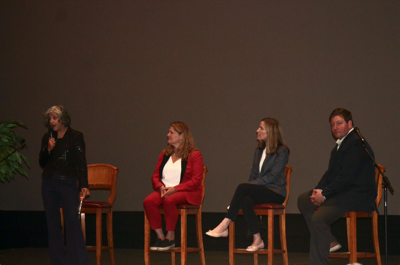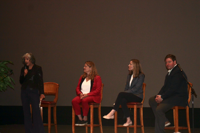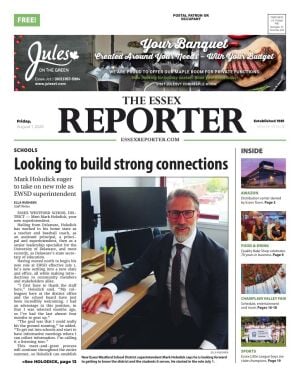
Legislators convene on-stage at Essex Cinema's community forum June 2.
ESSEX TOWN — “How many people in the audience think the country is on the right track?” Treasurer Mike Pieciak asked a crowd of over 100 Monday night.
A small number of hands shot up.
“They’re never shy, I know. That’s good,” he said.
Pieciak then asked to see those who feel the country is on the wrong track — the majority of the room morphed into a sea of raised hands.
“I wonder how many of you have been negatively impacted, or know somebody's been impacted by a federal policy over the last four months,” he said. “How many people have felt a higher degree of anxiety or concern or anger?”
Monday’s event was a nearly two-hour community forum about the impact of federal actions on Vermont, featuring speakers Vermont Attorney General Charity Clark, Secretary of State Sarah Copeland Hanzas and Treasurer Mike Pieciak, hosted by the Essex House delegation.
Rep. Rey Garofano (D-Essex Town) planned and moderated the event from the stage. Reps. Alyssa Black (D-Essex Town), Leonora Dodge (D-Essex Town), Karen Dolan (D-Essex Junction and Lori Houghton (D-Essex Junction) were also present.
“These are really unprecedented times, and there's a lot of anxiety as the news changes very regularly,” Garofano said in her opening remarks. “This is not a political event, this is about policy and what is happening in Washington, and how that will impact us here in Vermont.”
“This administration has come in with a lot of changes that will mean something to each and every one of us and our statewide leaders will go through how they're responding and prepping and tracking some of those changes for us,” she added. “This forum is also not a protest.”
Legislators speak on known, anticipated federal changes
Houghton opened by noting Vermont’s fiscal year 2025 budget was nearly $9 billion, with 36% of that — or $3.1 billion — sourced from federal funds. Half of that $3.1 billion is Medicaid, and the remainder is spread across education, heating, transportation and other state-led services.
And this doesn’t even account for federal funds that go to Vermonters directly in the form of SNAP benefits or nonprofit funding.
“Should we lose federal funding… Someone might say, ‘Well, what about our rainy day funds?’” Houghton said. “They are fully funded, and we attempt to fully fund them every year, but that's only about $300 million, so there is no way we can backfill the potential loss of $3.1 billion.”
The House Appropriations Committee is where the state budget begins, then it goes to the State Senate and then to Gov. Phil Scott.
This session, that committee heard from all the state agencies about what programs they run on federal dollars and whether their programs would be able to be scaled back or if they’d have to be eliminated with the loss of federal funds.
The governor can respond by changing funds and moving things around up to a certain dollar amount, then after that, Vermont’s joint fiscal office has some authority to direct where some things go, and at any point, if it's a $50 million loss to one program or multitude of programs, the legislature could be called back in order to react and determine what to do.
There’s also an emergency board that includes the governor and the state’s four Congressional money chairs, and a joint fiscal committee, made up of five House members and five Senate members, all of whom have the power to react, with the key being statewide communication.
Already, other, more specific strongholds are in place from the state’s legislative perspective.
Over 70% of Essex and Essex Junction residents voted to support a constitutional amendment for reproductive liberty in 2022, and since then, the legislature has passed several shield laws to protect the right to access as well as to protect those providing the care.
The state legislature also recently passed S.127, a housing bill, which expands Fair Housing protections to include immigration status, which the governor has said he will sign. Now signed into law is H.98, which clarifies standby guardianship processes for immigrant families, so if someone needs to ensure their children have a place to go, it clarifies all those processes.
S.44 authorizes the governor as the sole government branch capable of entering into any agreements with branches of the federal government, such as Immigration and Customs Enforcement. Prior to passing this legislation, which is now law, any town could join ICE.
Resolutions from this legislative session, which are not laws but reaffirm the state’s values, include memos supporting the rights and safety of transgender and nonbinary Vermonters as well as reaffirming Vermont’s relationships with Canada.
“Obviously, healthcare is probably the biggest place we can be affected,” Houghton said. “Although we're out of session or almost out of session, the work continues, and we will do everything we can.”
Copeland Hanzas was up next. As Vermont's chief elections administrator, she’s concerned to have seen the new administration put election security advisors in the cybersecurity and infrastructure security administration on leave since Donald Trump took office.
“We all remember the headlines that we heard back in 2016 and in 2020 about potential foreign interference in American elections,” she said. “Cybersecurity and infrastructure security administration was at that time told that we will designate elections infrastructure as critical infrastructure, which means that it gets a higher level of support and an investment.”
“This is on a par with protecting the cybersecurity of our hospital infrastructure, or of our energy grid or of our water systems,” she added. “These are all critical systems that would cause massive chaos if they were attacked successfully by foreign or domestic actors.”
On top of the firing of elections protections staff, the administration also declared that elections will no longer be considered critical infrastructure.
“It's also a little bit unfathomable how an administration who purports to be concerned about election security could now decide that cybersecurity is not an important part of that network,” she said.
The other big issue her office has seen with respect to changes from the feds is budgetary — Vermont receives $1 million in federal allocations for elections from Congress because states are the entities delegated to run federal elections.
This year, the best Vermont can hope to receive is just $275,000, but the version of the budget that passed out of the U.S. House before they went on recess included zero elections appropriation from the federal government for states to support the conduct of federal elections.
“So that's a pretty good indication that we shouldn't plan on receiving funding going forward,” Copeland Hanzas said.
The third big issue through her eyes is the combination of Trump’s executive order on verifying citizenship to maintain a spot on the voter registration roll, which tracks very closely to the SAVE Act, which has passed the House and is now sitting in the Senate — an acronym for safeguarding American voter eligibility.
“I can tell you, without being hyperbolic, that it actually does the opposite of that,” she said. “If you move, change your residence or go to register to vote for the first time, you would be required to show documentary proof of citizenship, which, for some people who are fortunate enough to travel internationally and have kept a current passport, might not be a big deal.”
“But if you are elderly, if you are very low income, if you are living in a rural area, the prospect of needing to gather all of the documentation in order to prove citizenship is going to amount to an effective barrier for people being able to be on the voter registration rolls,” she said.
Additionally, women who change their names when they get married have an additional hurdle in that they’ll need to be able to show why their name at birth is different from the name on their current government-issued ID, among other issues.
Clark spoke next on the litigation that is happening between Vermont and the U.S. government.
“I have sued the Trump administration 17 times,” she said. “It's a lot. Even during the first Trump administration, I think at that point in time, states had only sued once or twice.”
With her lawsuits and with the suits made by fellow state attorneys general nationwide, many of the federal administration’s harmful actions have been blocked, Clark said. Vermont’s lawsuits, updates and amicus briefs can be found if you click on the American flag at AGO.vermont.gov.
The topics of the suits range from things like attempts to dismantle the federal government, inventing fake emergencies to justify tariffs and usurping environmental laws, voter disenfranchisement, illegal DEI bans, violating Americans’ data privacy, unconstitutionally withholding money that Congress appropriated, and more.
“I'd rather be working on a lot of the problems that are facing Vermont right now, and instead I'm working on the problems that the federal government has created these past four months,” Clark said. “It's very disappointing, but here we are.”
Pieciak’s concerns about the federal government’s impact to Vermont’s economy are three-fold: that 36% of Vermont’s budget dependent on billions from the feds that support education, healthcare and labor in-state; the fact that one in five Vermonters work in the nonprofit sector which is largely funded by federal revenues; and the potential impact of tariffs on Vermont, given Vermont’s status as the no. 1 trade partner in the U.S. with Canada and its dependence on Canadian tourism for $150 million annually.
“A manufacturer right here in Essex told me they had to pay a $9 million tariff for product they were importing from overseas,” Pieciak said.
“Are they going to incorporate that $9 million into the cost, or are they going to eat it?” Pieciak said. “And most businesses, particularly small businesses in Vermont aren't in a position to eat a cost like that. They're going to have to pass it on. And when you pass it on, you don't know if your consumers are willing to pay the price of that extra cost compared to larger competitors.”
Pieciak wants to see things made and sold in Vermont to Vermonters, for the state to generate wealth rather than for wealth to be extracted from it — but tariffs have the opposite effect.
Questions from the public
The panelists took about a dozen questions from the crowd after concluding their presentation.
Folks asked about Trump’s lawsuit compliance and shared concerns about the federal desire for a database of those with autism as it relates to data and medical privacy. Both are concerns shared by Vermont, which Clark said are being monitored for if any action is taken.
Essex senior Luanne Paoli came concerned about how the loss of $3 billion could impact Vermont’s most marginalized, asking if Vermonters had to participate in such a system at all.
“It might be outlandish, but I remember hearing some scuttle about, what happens if we stop paying federal tax?” she asked. “What happens if the things that come out of our wages, instead of going to the federal income tax, goes only to the state?”
“Is there any reality or legality to that? Would that ever happen? Would it ever help a state like Vermont to recoup that money?” she said. “If they're going to withhold it anyway, why send it to them to begin with? I'm just wondering, is it realistic, legal, possible? Thinking outside the box.”
Clark said if it happens that Trump prevents appropriating federal tax dollars to Vermont, the state can sue, because his administration has no legal authority to do that — but her office still has its eye on Congress in case a bill of the same flavor were to come out of there.
Clark also anticipates Congress will flip to become more Democrat-heavy to contrast the Republican president after the mid-term election, as is typical after a president is elected.
But Paoli’s fears as a low-income senior remained untouched.
“I appreciate that you're here, but I'm still terrified,” she said. “What I've been watching for the past 100 plus days is a president who continues to get away with illegality and unconstitutionality.”
“And I hear so much ‘We’ve got to get to the midterms, we got to get the midterms,’ but I'm also hearing he can declare through martial law not having elections at the midterm,” she added. “And that, I think, is a reality, and I know that nobody wants it to be — I'm afraid of that.”
Copeland Hanzas chimed in here to say it’s a big hypothetical to consider on what grounds a president might choose to institute martial law, but pointed out elections are run by the states as is foundational according to the Constitution, that states determine the time, place and manner of federal elections and that only Congress can put parameters around that.
Essex resident Alexis Dubief asked what else can be done in terms of shield laws and protections for the people of Vermont, to prevent neighbors from being whisked off to other states or countries without due process or reasonable paths to citizenship.
“We thought about it as the state of Vermont is going to have to become the backstop, so that if the ball gets past the catcher, because he's throwing some wild pitches out there, we've got a backstop that makes sure that Vermonters still have their rights being protected,” Clark said.
Pieciak noted Proposal 3 is going to become a constitutional amendment for the right to organize in Vermont, which would make Vermont the second state to pass that amendment — to be on the ballot in 2026. He also thinks of unions as a source of power, checks and balances.
Throughout the Q&A, a number of individuals came to the microphone to push transphobic and anti-immigrant agendas — proponents of FERPA, who want trans kids’ identities reported to their parents against their will, and those who interpret Title IX in a trans-exclusionary manner, who believe trans girls are a threat to cis girls in sports, bathrooms and locker rooms.
All four of these individuals misgendered trans girls and women as “males” or “men.”
“There have been many instances in my life where I have felt threatened physically by a man, and it was never in a locker room,” Copeland Hanzas said.
Also present from some of the same speakers were some anti-immigration sentiments.
One such speaker blatantly said they didn’t want their question answered by Pieciak — on account of his board membership with Outright Vermont, a social services organization serving queer, trans and allied youth.
“Trans people deserve our respect. They deserve our love. They are our neighbors,” Clark said. “I appreciate that you are concerned about an issue that I don't even see and I have certainly not experienced in my life.”
“What I have experienced in all the dozens of trans people in my life is they have been targeted and they have been discriminated against, and they have suffered, and all I want to do is stand up for them, and I always will,” she added.
Right behind the first public commenter who spoke out in this manner was a trans woman — also in line to ask an unrelated question about how rural communities will be impacted by floods and a loss of funding. Flustered, she did not state her name at the microphone.
“I'm a little bit upset right now because I felt verbally assaulted standing in line and scared, standing in line here in this room because of the horrific allegations that are made towards trans folk,” she said. “I guarantee you that trans people are much more scared in a bathroom than anyone else, regardless which one they choose.”
In response to her question of why Vermont is stripping state funds from programs like the Municipal Technical Assistance Program which supports rural communities, she was told a new permanent paralegal position was just approved to work alongside the state’s municipal affairs attorney, who could help answer her question if she emailed for more information.
“Happy Pride,” Pieciak said to her. “For those of us up here as state leaders, we respect the dignity and value of every person and you're loved and part of the community… But thank you for your work. Supporting rural Vermont is very critical.”





(0) comments
Welcome to the discussion.
Log In
Thank you for taking part in our commenting section. We want this platform to be a safe and inclusive community where you can freely share ideas and opinions. Comments that are racist, hateful, sexist or attack others won’t be allowed. Just keep it clean. Do these things or you could be banned:
• Don’t name-call and attack other commenters. If you’d be in hot water for saying it in public, then don’t say it here.
• Don’t spam us.
• Don’t attack our journalists.
Let’s make this a platform that is educational, enjoyable and insightful.
Email questions to bhigdon@orourkemediagroup.com.